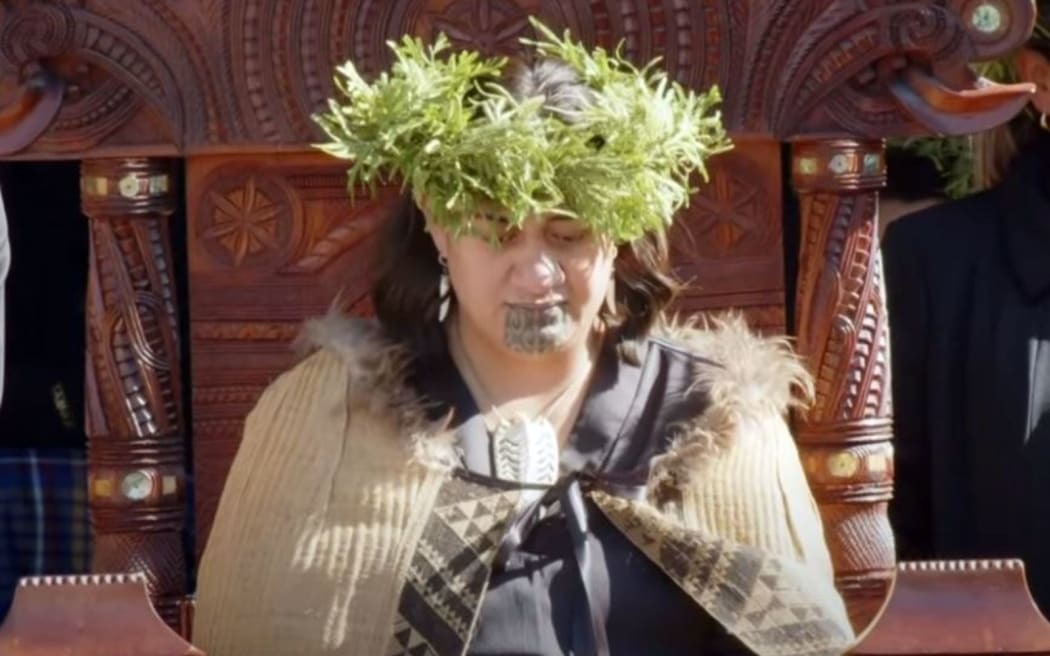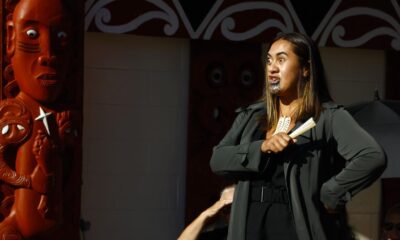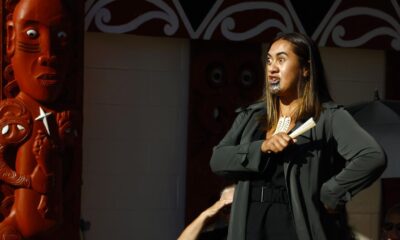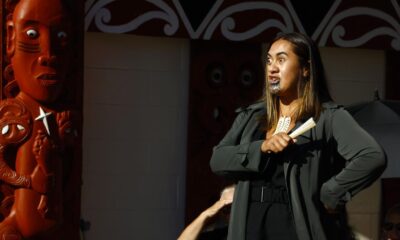Politics
Young Leaders Reflect on the Impact of the Māori Queen

In March 2023, a significant chapter in Māori history unfolded at Tuurangawaewae Marae in Ngaaruawaahia, where thousands gathered to bid farewell to the late Māori King, Kiingi Tuheitia Pootatau te Wherowhero VII, and welcome his successor, Te Arikinui Kuini Nga wai hono i te po. The ceremony, known as Te Whakawahinga, marked the beginning of her reign as the eighth Māori monarch and only the second woman to hold this esteemed position.
The moment was charged with emotion, particularly for young girls and their mothers, as the new queen walked through the ornately carved gates. This week, the Kiingitanga commemorates the first anniversary of that pivotal day with Koroneihana, an annual celebration that brings together iwi and politicians from across the motu.
Voices from the Whānau Room
At the Auckland University of Technology’s (AUT) city campus, students gather in the ‘whānau room’, a dedicated space for Māori students to connect and unwind. During lunchtime, the atmosphere is lively, with music and trays of food being shared. Here, we spoke with several students about the significance of the Kiingitanga and the new Māori Queen.
Initially hesitant to share their thoughts, many students expressed a sense of responsibility to represent their community. Alyssa, a first-year student, recalled the emotional moment of the queen’s announcement. “When she came out, everybody was like, ‘Who is it? Who’s it gonna be?’ And then we all realised, ‘Oh my gosh, it’s her.’ It was just that moment of power,” she said.
Te Arikinui Kuini Nga wai hono i te po‘s age resonates with the younger generation, according to Noah Singe, a descendant of Waikato. He noted that her visibility at significant events, including the Hīkoi mō te Tiriti in October 2024, has strengthened her connection to Māori youth. “It’s really good to get our leaders out there and amongst it,” he said.
Challenges Facing the Māori Community
Students expressed concerns about the authenticity of Māori identity in a changing political landscape. “One of the main issues facing rangatahi is staying strong, especially within this political climate,” Singe said. The ACT Party has criticized spaces dedicated to Māori and Pasifika students as a form of segregation, which has affected morale among students.
Despite these challenges, the students see potential in having a younger monarch. The Kiingitanga, established in 1858 with the aim of uniting iwi and protecting Māori culture, continues to play a vital role. “The Kiingitanga is a platform for rangatahi to interact with and get their voices heard,” Singe noted.
Reflecting on the significance of the previous year’s events, Hera Watene, a communications student, emphasized the importance of participation in the King’s tangi. “We got to see history coming forward, and it may have been really mamae, but that’s so important to be there. I felt the wairua,” she said.
As the Kiingitanga moves forward under the leadership of Te Arikinui Kuini Nga wai hono i te po, young Māori see an opportunity for a long reign that may allow her to implement her vision for the future. The commitment of the new queen to her community and culture suggests a promising direction for Māori leadership in the years to come.
-

 Sports1 month ago
Sports1 month agoNetball New Zealand Stands Down Dame Noeline Taurua for Series
-

 Entertainment1 month ago
Entertainment1 month agoTributes Pour In for Lachlan Rofe, Reality Star, Dead at 47
-

 Entertainment1 week ago
Entertainment1 week agoNew ‘Maverick’ Chaser Joins Beat the Chasers Season Finale
-

 Sports1 month ago
Sports1 month agoSilver Ferns Legend Laura Langman Criticizes Team’s Attitude
-

 Entertainment2 months ago
Entertainment2 months agoKhloe Kardashian Embraces Innovative Stem Cell Therapy in Mexico
-

 Sports2 months ago
Sports2 months agoGaël Monfils Set to Defend ASB Classic Title in January 2026
-

 World3 months ago
World3 months agoPolice Arrest Multiple Individuals During Funeral for Zain Taikato-Fox
-

 Politics2 weeks ago
Politics2 weeks agoNetball NZ Calls for Respect Amid Dame Taurua’s Standoff
-

 Entertainment3 weeks ago
Entertainment3 weeks agoTyson Fury’s Daughter Venezuela Gets Engaged at Birthday Bash
-

 Sports3 weeks ago
Sports3 weeks agoHeather McMahan Steps Down as Ryder Cup Host After Controversy
-

 Entertainment3 weeks ago
Entertainment3 weeks agoTyson Fury’s Daughter Venezuela Gets Engaged at Birthday Bash
-

 World3 weeks ago
World3 weeks agoNew Zealand Firefighters Plan Strike on October 17 Over Pay Disputes




















